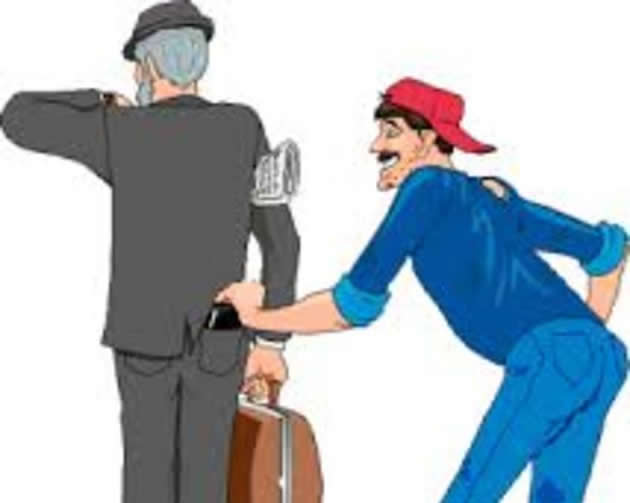The thief who came from our village


In the village it is believed that a thief is a thief and if the law does not punish him, one day the ancestors will
Sekai Nzenza On Wednesday
The chief village thief sat among elders at the wedding in Mbare on Saturday. I recognised him immediately. How could anyone who passed through Mbare Musika, the main market place in Harare, not know Saizi, the tall giant man responsible for many petty thefts around Mbare since the late
1970’s?
Saizi still carries the title of chief thief, although he does not steal anymore. In fact, nobody in the village or in the many villages nearby can stand up and say, Saizi stole my bicycle, my goat or my chicken. No. Throughout his thieving career, Saizi will tell you that he never stole from anyone he knew, nor did he steal from any families who lived this side of the Hwedza Mountains.
It was an agreed principle among thieves at Mbare Musika that you do not steal from people who come from your district, let alone those who come from anywhere near your village.
How would you face the people if you did that? You only steal from those who do not know you and those who are not related to you.
Growing up in the village, we knew about Saizi’s “work” in Salisbury.
When Saizi first arrived in Salisbury in the late 1970’s, he stayed with a cousin in the bachelor flats in Mbare, that run down housing complex near Matapi Police Station.
These days, you see dirt or perhaps sewage running down the gutters.
In the old days, it was not like that.
Those flats were clean and not at all as crowded as they are when Saizi arrived.
It was illegal for women and children to live there. Now you see many children playing in the dust and women hanging spotless white nappies to let them dry and flap in the wind, surrounded by the rubbish and filth.
Upon arrival in Salisbury Saizi shared a room with other men.
Every day, the employed men went to work in the factories. Saizi walked around the industries in Graniteside, Southerton and Willowvale looking for jobs, any jobs. But there were signs at the gates of factories written, “Hapana Basa, Hakuna Musevenzo”, meaning there was no work. After confronting those signs everywhere he went, Saizi decided to sell matches, cigarettes, pies, doughnuts, safety pins, pegs, needles, Afro combs or anything that he could carry. He walked around Mbare Musika from one bus terminus to the other trying to convince passengers going back to their villages to buy his products. For the first few months, he stood around the buses going to our village. He helped people load goods on top of the bus.
Saizi never went back to the industries to look for work. Mbare Musika became his hunting ground. He sold his gadgets only to show people that he had a job. News filtered to the village saying that Saizi was making money from robbing vulnerable people, mostly women, who were boarding buses to return to their villages in the rural areas.
People said Saizi knew exactly where money was kept on a person.
He had difficulty robbing women because the only safe place for a woman to keep money was inside the cup of her brassier.
In there, Saizi did not dare touch. He respected women’s bodies.
One time, before the liberation war, during the Rhodes and Founders Day, Saizi’s wife stopped by our homestead on her way to the bus stop to wait for groceries that Saizi sent from Salisbury.
Saizi had written a letter to say that he was not coming home because he was very busy around the holidays.
Although Saizi’s wife did not say why Saizi was busy, we all knew that this was the time when people from the city bought groceries and took money back home to their villages.
I recall meeting Saizi when we arrived in Salisbury for the first time during the liberation war. The war was at its peak and my mother said we must leave and go to the city. With me were my two sisters, Charity and Paida.
We had never been to Salisbury before. We were going to stay with our big sister Constance who lived in a flat at a place called Charles Briggs Court.
We did not know where these flats were, although my mother had described many times that the block was not far at all.
She said we would cross the main street going west and walk through the trees. If we went as far as the Rhodesia Broadcasting Service along Beatrice Road, then we would have missed Charles Briggs.
But my mother should not have worried at all because Saizi was right there at the bus terminus when we arrived, busy selling his products.
He carried our bags full of ground millet, pumpkins, dried nuts and peanut butter. Saizi took us to Charles Briggs Court, the elite flats for the educated Africans where Sis Constance, who had just graduated as a nursing sister, lived.
Later on we settled in a two-bedroomed flat in Glen Norah B with our brother Charles who worked for Air Zimbabwe. He was one of the first Africans to get a job with the airline.
My sisters and I would often go to Mbare Musika looking for Saizi so he could give us news about the village. We asked if it rained over there? How was our mother? How far were the people walking to catch the bus after crossing the Save river?
Saizi would tell us everything that was happening, including the movements of the Rhodesian forces, the notorious Selous Scouts and the work of ZANLA and ZAPU liberation war fighters.
When headmaster Mapeza was killed at Mufudzi Wakanaka School and our brother Sydney was spared, it was Saizi who whispered this to us.
He said we should not contemplate ever going to the village at all, even after ceasefire was announced and liberation fighters were making their way to assembly points. Saizi knew everything.
He also knew what was happening in the Honde Valley, Mazowe and Mt Darwin or Mutoko because his fellow thieves shared home information with him.
During the independence celebrations, Saizi said he walked along with the guys from Matapi flats to watch Bob Marley perform at Rufaro stadium.
This, he said, was the highlight of his life. Although there were more opportunities for jobs after independence, Saizi was too used to stealing.
It was age and a sore leg that forced Saizi to retire from his trade. Besides, competition to steal at Mbare Musika became more difficult after the economic crisis of 2008.
There were many young and ruthless men who could use all kinds of trickery and distraction to steal from unsuspecting passengers and shoppers. But the ethics of the business remained the same: you do not steal from people who come from your village. Muroyi royera kure, kuti vekure vakutye.
Some people in the village say Saizi was born to be a thief. He belongs to a type of people who are possessed by the shavi, or bad spirit to steal. The shavi simply chooses who it wants to sit on and possess. Saizi’s had inherited the shavi from his father who was a cattle thief. Stories are still being told about how Saizi’s father, a farm labourer at Fair Adventure near Hwedza, stole cattle. Saizi’s father led a gang of farm workers who put gum boots on cattle hooves so there would be no foot steps to be traced through the forests.
For years, the gang slaughtered the cattle in the makonoronga or the valleys nearby. The white farmer, murungu, never knew until one day, someone reported the thefts and led the farmer to the valley. Murungu found a valley littered with carcasses of his cattle. He said nothing and waited until he ambushed the thieves one night.
He caught one of the thieves. But Saizi’s father escaped and returned home.
Last Saturday, I saw Saizi sitting at the elders’ table during the wedding of his niece who also happened to be marrying my cousin’s son.
The bride and groom were both in their early twenties, post-independence children, born and brought up near Mbare Musika, the place where Uncle Saizi brought so much misery to passengers going home to their families.
“Makadii Nyakudirwa?”
I greeted Saizi, addressing him with his totem. I joked that he was back to the place of his former business. He grinned happily and said. “We committed many small thefts, but I swear that I never stole from any one from our village.” Others laughed but one elderly woman said, “It did not matter who the victims were, you caused misery to many people. A thief is a thief. If the law does not punish him, one day the ancestors will.”
- Dr Sekai Nzenza is a writer and cultural critic.










Comments